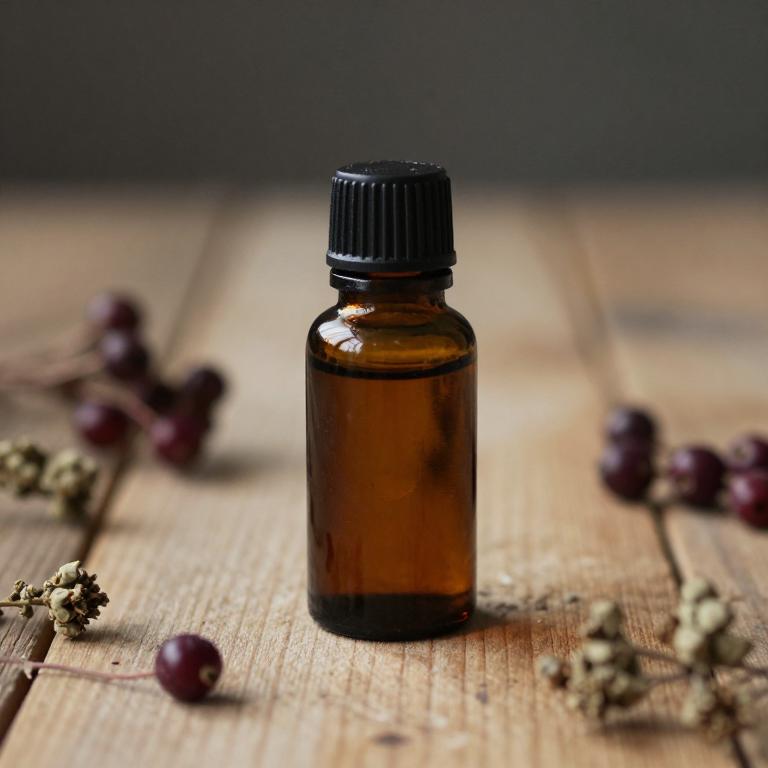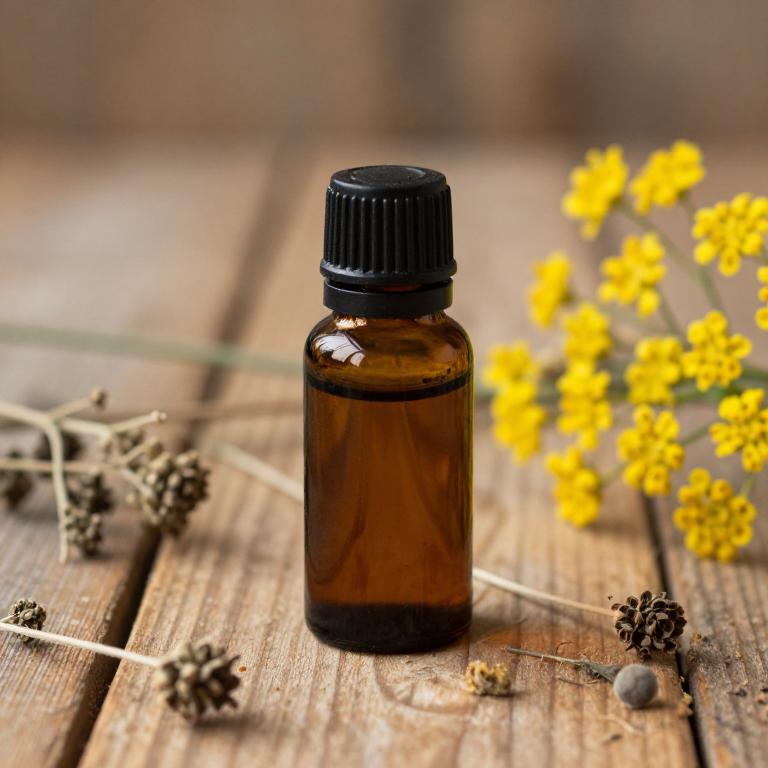10 Best Herbal Essential Oils For Gas In Stomach

Herbal essential oils such as peppermint, ginger, and fennel are commonly used to alleviate gas and bloating in the stomach due to their natural digestive properties.
Peppermint oil, known for its calming effect on the gastrointestinal tract, can help relax the muscles and ease discomfort caused by trapped gas. Ginger oil is often used to reduce inflammation and promote digestion, making it effective in preventing gas buildup. Fennel oil is also popular for its ability to soothe the digestive system and aid in the expulsion of gas.
When using these essential oils, it is important to dilute them properly with a carrier oil to avoid skin irritation and ensure safe application.
Table of Contents
1. Fennel (Foeniculum vulgare)

Foeniculum vulgare, commonly known as fennel, is a herbal plant widely used for its essential oil, which is known to help alleviate gas and digestive discomfort.
The essential oil of fennel contains compounds like anethole and fenchone, which have carminative properties that help reduce bloating and ease gas buildup in the stomach. It is often used in aromatherapy or as a digestive aid to promote smooth digestion and relieve symptoms of indigestion. Fennel essential oil can be taken orally in diluted form or used in steam inhalation to support digestive health.
However, it is important to consult a healthcare professional before using it, especially for pregnant women or individuals with existing medical conditions.
2. Ginger (Zingiber officinale)

Zingiber officinale, commonly known as ginger, is widely recognized for its medicinal properties, particularly its ability to alleviate gas and digestive discomfort.
The essential oils derived from fresh ginger roots contain bioactive compounds such as gingerol and zingiberene, which possess anti-inflammatory and carminative effects. These oils can help relax the gastrointestinal tract, reduce bloating, and ease the movement of gas through the digestive system. When used in aromatherapy or diluted in a carrier oil, ginger essential oil may provide relief from gas-related symptoms.
However, it is important to use it in moderation and consult a healthcare professional, especially for individuals with sensitive stomach conditions or allergies.
3. Black pepper (Piper nigrum)

Piper nigrum, commonly known as black pepper, contains essential oils that have been traditionally used to alleviate digestive discomfort, including gas in the stomach.
The essential oils derived from black pepper, particularly those containing compounds like piperine, may help stimulate digestion and reduce bloating by enhancing the movement of food through the gastrointestinal tract. These oils can also have antimicrobial properties that may help eliminate harmful bacteria contributing to gas and indigestion. However, while some studies suggest potential benefits, more research is needed to fully understand their efficacy and safety when used as a natural remedy for stomach gas.
As with any herbal remedy, it is advisable to consult a healthcare professional before using piper nigrum essential oils, especially for individuals with existing medical conditions or those taking medications.
4. Ceylon cinnamon (Cinnamomum verum)

Cinnamomum verum, commonly known as true cinnamon, contains essential oils that have been traditionally used to aid in relieving gas and digestive discomfort.
The essential oils derived from its bark contain compounds like cinnamaldehyde and eugenol, which possess antimicrobial and anti-inflammatory properties that can help reduce bloating and gas buildup in the stomach. These oils may also stimulate digestion by improving the movement of food through the gastrointestinal tract, thus preventing the formation of excess gas. When used in aromatherapy or diluted in a carrier oil, cinnamon essential oil can provide a soothing effect on the digestive system.
However, it is important to use these oils cautiously and consult a healthcare professional before incorporating them into a treatment regimen for digestive issues.
5. Turmeric (Curcuma longa)

Curcuma longa, commonly known as turmeric, contains essential oils that have been traditionally used to alleviate digestive discomfort, including gas in the stomach.
These essential oils possess anti-inflammatory and carminative properties that help reduce bloating and ease gastrointestinal spasms. The active compounds in turmeric essential oils, such as curcuminoids, may support digestion by promoting the release of digestive enzymes. While essential oils from Curcuma longa can be beneficial, they should be used in moderation and often diluted with a carrier oil to avoid irritation.
Incorporating turmeric essential oils into a balanced diet or using them in aromatherapy may offer natural relief for occasional digestive gas.
6. Thyme (Thymus vulgaris)

Thymus vulgaris, commonly known as thyme, is a popular herb used in aromatherapy and herbal medicine for its potent essential oils.
The essential oil of thyme contains compounds like thymol and carvacrol, which are known for their antimicrobial and digestive properties. When used in diffusers or applied topically, thyme essential oil may help alleviate symptoms of gas and bloating by promoting healthy digestion and reducing gastrointestinal discomfort. However, it is important to dilute the oil properly before use to avoid skin irritation.
While thyme essential oil can be a supportive remedy for gas in the stomach, it should not replace professional medical advice, especially for persistent or severe digestive issues.
7. Peppermint (Mentha piperita)

Mentha piperita, commonly known as peppermint, is a widely used herb in aromatherapy for its refreshing and soothing properties.
The essential oil extracted from its leaves contains powerful compounds like menthol and limonene, which are known to help relieve gastrointestinal discomfort. Peppermint oil is often used to alleviate symptoms of gas, bloating, and indigestion due to its ability to relax the muscles of the digestive tract. It can be applied topically, diluted with a carrier oil, or used in steam inhalation to provide relief from stomach discomfort.
However, it is important to consult a healthcare professional before using peppermint oil, especially for individuals with certain medical conditions or those taking medications.
8. Caraway (Carum carvi)

Carum carvi, commonly known as caraway, produces an essential oil that has been traditionally used to alleviate digestive discomfort, including gas in the stomach.
The oil contains active compounds such as limonene and alpha-pinene, which have carminative properties that help reduce gas and bloating. When used in aromatherapy or diluted in a carrier oil, caraway essential oil can promote healthy digestion and ease gastrointestinal discomfort. It is often recommended for individuals experiencing indigestion or trapped gas due to its ability to stimulate the digestive system.
However, it should be used with caution and under the guidance of a qualified aromatherapist or healthcare provider.
9. Dog rose (Rosa canina)

Rosa canina, also known as dog rose, is a traditional herbal remedy that contains essential oils which may help alleviate gas and bloating in the stomach.
These essential oils, derived from the flowers and fruits of the Rosa canina plant, are known for their anti-inflammatory and carminative properties, which can soothe digestive discomfort. When used in aromatherapy or as part of a digestive herbal blend, the essential oils from Rosa canina may help reduce intestinal gas by promoting healthy digestion and easing gastrointestinal spasms. However, it is important to consult with a healthcare professional before using these oils, especially if you have a history of digestive disorders or are pregnant.
While Rosa canina essential oils show promise in supporting digestive health, they should be used as part of a holistic approach to managing gas and stomach discomfort.
10. Dill (Anethum graveolens)

Anethum graveolens, commonly known as star anise, is a spice and herbal plant whose essential oil has been traditionally used for its digestive benefits.
The essential oil of star anise contains compounds such as anethol and limonene, which possess carminative and antispasmodic properties, making it effective in relieving gas and bloating in the stomach. When used in aromatherapy or diluted in a carrier oil, it can help soothe gastrointestinal discomfort and ease digestive spasms. Its warming effect can also aid in reducing stomach cramps and promoting better digestion.
However, it is important to use it in moderation and consult a healthcare professional before incorporating it into a treatment regimen, especially for those with existing health conditions or during pregnancy.